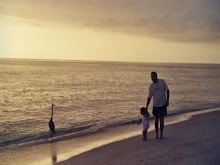 We spent the Christmas holiday in Vegas, ideal location if you are traveling, as I did, with a 7 year old and a 1 year old. Las Vegas is far from Boston, almost 6 hours by plane, more or less like London, but with those little kids, it felt to me like New Zealand.
We spent the Christmas holiday in Vegas, ideal location if you are traveling, as I did, with a 7 year old and a 1 year old. Las Vegas is far from Boston, almost 6 hours by plane, more or less like London, but with those little kids, it felt to me like New Zealand.Despite the tiring trip, we had a great time. Weather was good, temperature around 65F degrees, mostly sunny, great. Our hotel was fantastic, the MGM Grand, and our room had a great view to the northern part of the Strip, we could even see the water show at the Bellagio from our room. Most of the foreign visitors were Chinese, some Europeans and people from South America, but the vast majority was Chinese. I only saw one Spanish couple.
 I also saw a guy wearing the Madrid track jacket with the Barcelona soccer club logo on. I tried to take a picture, but the result was not so good. You can hardly see the jacket, but you will recognize it if you click here. I was going to delete the picture, but I thought it may become useful if he decides to go to Spain in his next trip instead of going back to Vegas. The plastic surgeon may need it to reconstruct his face.
I also saw a guy wearing the Madrid track jacket with the Barcelona soccer club logo on. I tried to take a picture, but the result was not so good. You can hardly see the jacket, but you will recognize it if you click here. I was going to delete the picture, but I thought it may become useful if he decides to go to Spain in his next trip instead of going back to Vegas. The plastic surgeon may need it to reconstruct his face.We also went to see David Copperfield’s magician show in shifts (someone had to stay back to look after the 1 year old). It was a good show but I was somewhat disappointed. The tricks are OK, but I think I can guess the kind of technology behind and I am afraid that half of the volunteers are part of the show. In addition to it, the guy is so presumptuous. He spends 45 minutes of the show either talking about himself or showing video clips of people who praise him, but we had fun at $97 a pop.
In the wine shops I was not able to find any of the Toledo, Logroño or Murcia cava bottles that seem to be hot in the "rest of Spain" boycotting market. There was plenty of Catalan cava (Freixenet) at $14.99. What a price!!! I buy it at Costco at $6.99 and you can buy it in BCN for less that $4.00, so I decided to celebrate the new year with Bacardí;, the founder of which was born in Sitges (Barcelona) and together with some coke it lasted me for a few days, that's the cocktail we call Cuba Libre (free Cuba = Bacardí-Coke).
Another remarkable thing is that while Freixenet sales have dropped 4% in Spain as a consequence of the boycott, all the advertisement made by Freixenet in USA is Spanish stereotype centric (something that really kills me). If you go to Gloria Ferrer's website (a Freixenet group company), you will see that they advertise the Catalan Festival with Flamenco dancers (put your cursor on the picture and you will be able to read "Catalonian dancers") and a Valencian paella (I do not have a big problem with the paella, but I do not want to debate this time the Països Catalans issue).
I cannot accept that the Spanish government portrays all Spaniards in their promotion campaigns as bullfighters or flamingo dancers, but I find it even more intolerable that a Catalan company bastardizes our culture for one point of market share. Why not using the “calçotada” (grilled spring onions more or less), the “castellers” (human towers) and the “sardana” (Catalan traditional collective dance) instead?. And I have already drunk by myself two cases of Freixenet this Xmas to counter the boycott. My goodness!!!
Changing subject, in part two I will explain why I think we should create a Las Vegas in Los Monegros (Zaragoza).

 In the Spanish speaking countries, the word
In the Spanish speaking countries, the word 



